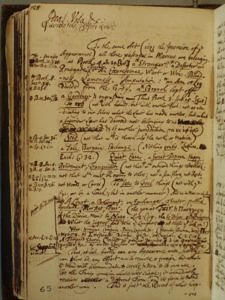Askêmata
First published by Benjamin Rand as Shaftesbury’s “Philosophical Regimen”, the manuscript Askêmata, entered into two notebooks (TNA: PRO 30/24/27/10 Parts 1 and 2; the second part is currently missing), show their author “training” as a philosopher in the manner prescribed by Epictetus and demonstrated both in Arrian’s Discourses and later by Marcus Aurelius. The texts document the Earl’s personal “Closet-Work”, his struggle to formulate for himself the rules to be ingested, to compose a private manual and record of his own progress and improvement. These being “such Exercises as come under the notion of this self-discoursing Practice”, they were never meant for publication, never intended as “treasur’d Riches” for pouring out “in Plenty on the necessitous World”, but for the writer’s “own particular Benefit and Use” (Soliloquy).
Written largely in Holland during two periods of retreat (1698/99 and 1703/4), the collection is heterogeneous in form and in style, ranging from the earlier sober and logical to the later emotional and spiralling, from the almost scholastic to the poetic and prayer-like, verging even on the mystic. The common denominator is the situation of retreat or, more simply, the addressee: Shaftesbury is alone with himself, caring for himself, testing, debating with and exhorting himself.
When first published in 1900, Askêmata were read as outpourings of Shaftesbury’s Stoicism. Our introduction in this volume (9-56) discusses briefly previous readings of the text, embedding our own interpretation in Shaftesbury’s later ‘contextualization’ of Stoic doctrine in the age of Horace. In a letter to Pierre Coste (October 1706), he would argue that the Academic, Peripatetic, and Stoic schools together represented one of the only “two real distinct Philosophys” then in existence and were “deriv’d from Socrates”, for him always a mark of the “true” philosophy. The sociability of Epictetus and Marcus Aurelius was, then, for Shaftesbury “stoical truly Socratick”. Similarly, we look at the text’s relation to the Earl’s Characteristicks, arguing that, while the Askêmata notebooks could be regarded as the key to a fuller understanding of Characteristicks, the opposite could also be true: the manuscripts perhaps need to be considered in the light of the works which the Earl himself did actually publish, first (in some cases) separately, then again together and with his own notes and commentary.
Our edition of the two notebooks – each compiled in the form devised by John Locke for his commonplace books – represents a compromise between the priority given by Benjamin Rand to philosophical content, and the need to illustrate Shaftesbury’s sometimes complex procedure. The entries belonging to each of his headings are united here to create thematic units, but the original layout and chronology remain obvious at every stage. We have, then, been at pains to illustrate on the one hand that the Earl himself by no means created from the start an orderly succession of chapters, each with their own internal development and compact structure, but on the other that he did feel the retrospective need to make of the entries a ‘patterned mess’. Our annotations are designed principally to smooth the way for readers unfamiliar with his biography, for example, or with the texts to which he constantly turns.
In the appendix, we have assembled a number of related manuscript texts, some of them indispensable for a proper understanding of Askêmata:
471-72: Oikonomia; an undated fragment of paper, now affixed to p. 201 of the first Askêmata notebook.
473-508: the “Parchment”; written in Holland (1704) on seven sheets of vellum, which were folded to create an unbound notebook (TNA: PRO 30/24/27/11). Laurent Jaffro (1994) calls this “une petite copie portative, très commode” of Shaftesbury’s preface to the first Askêmata, and Lawrence Klein (1994) describes the “Parchment” as “an actual table of moral practice, a Shaftesburian decalogue, lifted from the works of Marcus Aurelius and Epictetus and intended as a cursory guide for his own ethical life”. The “Parchment” appears to have been written, then, as a ‘pocket encheiridion’, a practical guide: “Enough said, thought, written …Wt further? Now firm. Now adhere”.
509-28: the Excerpta; found in a leather-bound notebook (TNA: PRO 30/24/27/12) which Shaftesbury refers to as his “little Black paper-Book”. The excerpts, probably entered before his second retreat (1703/04), appear under various headings (e.g. “Deity”, “Liberty”) and include not only texts from the Askêmata which he recycled in The Sociable Enthusiast, but also a number of passages e.g. from Plato and Maximus of Tyre.
529-31: The Laws, entered at the back of Shaftesbury’s Excerpta notebook, offer a shortened version of the two tables of Greek “Laws” found in his Askêmata. Date uncertain, but most likely between 1700 and 1704.
532-41: the “Prayer”; an untitled and undated manuscript (TNA: PRO 30/24/26/7) which reflects Shaftesbury’s interest in the nature and practice of prayer, an interest visible throughout his private and published writings. For F. H. Heinemann (1952) this is “a prayer of Shaftesbury to his God”, one which “provides the pattern for many passages in The Moralists […] which could otherwise be mistaken for pure literature”. Dirk Grossklaus (2000) sees the prose prayer as ‘evidence of its writer’s private religious life’, a text in which Shaftesbury follows ‘both the Christian and the Neoplatonic tradition’, but uses this ‘exercise in the presence of the divine’ as a means to ‘becoming one with his own rational being’.
542-43: brief Dogmata; entered by Shaftesbury on the unnumbered last page of the unbound notebook used for his “Prayer”.
